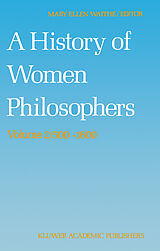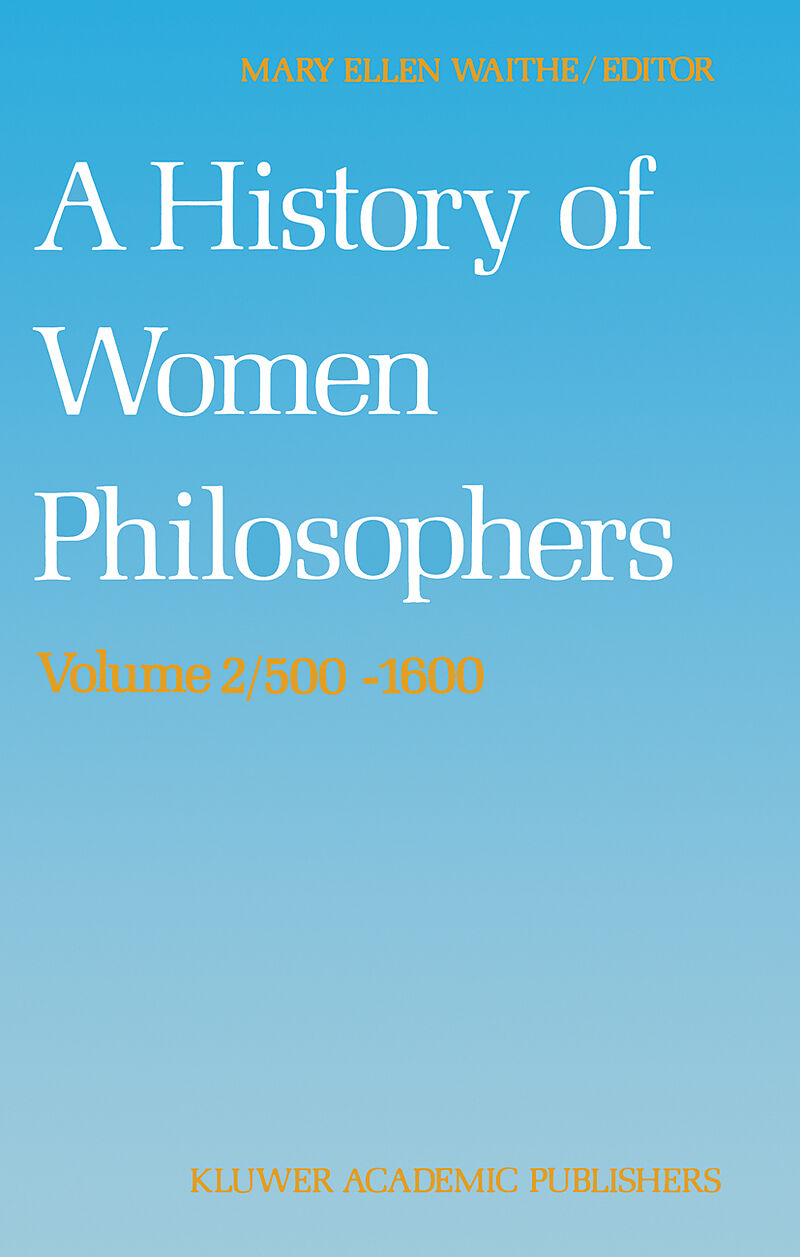A History of Women Philosophers
Einband:
Kartonierter Einband
EAN:
9789024735723
Untertitel:
Medieval, Renaissance and Enlightenment Women Philosophers A.D. 500 1600
Herausgeber:
Springer Netherlands
Auflage:
Softcover reprint of the original 1st ed. 1989
Anzahl Seiten:
392
Erscheinungsdatum:
31.12.1989
ISBN:
9024735726
aspirations, the rise of western monasticism was the most note worthy event of the early centuries. The importance of monasteries cannot be overstressed as sources of spirituality, learning and auto nomy in the intensely masculinized, militarized feudal period. Drawing their members from the highest levels of society, women's monasteries provided an outlet for the energy and ambition of strong-willed women, as well as positions of considerable authority. Even from periods relatively inhospitable to learning of all kinds, the memory has been preserved of a good number of women of education. Their often considerable achievements and influence, however, generally lie outside even an expanded definition of philo sophy. Among the most notable foremothers of this early period were several whose efforts signal the possibility of later philosophical work. Radegund, in the sixth century, established one of the first Frankish convents, thereby laying the foundations for women's spiritual andintellectual development. From these beginnings, women's monasteries increased rapidly in both number and in fluence both on the continent and in Anglo-Saxon England. Hilda (d. 680) is well known as the powerful abbsess of the double monastery of Whitby. She was eager for knowledge, and five Eng lish bishops were educated under her tutelage. She is also accounted the patron of Caedmon, the first Anglo-Saxon poet of religious verse. The Anglo-Saxon nun Lioba was versed in the liberal arts as well as Scripture and canon law.
Klappentext
aspirations, the rise of western monasticism was the most note worthy event of the early centuries. The importance of monasteries cannot be overstressed as sources of spirituality, learning and auto nomy in the intensely masculinized, militarized feudal period. Drawing their members from the highest levels of society, women's monasteries provided an outlet for the energy and ambition of strong-willed women, as well as positions of considerable authority. Even from periods relatively inhospitable to learning of all kinds, the memory has been preserved of a good number of women of education. Their often considerable achievements and influence, however, generally lie outside even an expanded definition of philo sophy. Among the most notable foremothers of this early period were several whose efforts signal the possibility of later philosophical work. Radegund, in the sixth century, established one of the first Frankish convents, thereby laying the foundations for women's spiritual andintellectual development. From these beginnings, women's monasteries increased rapidly in both number and in fluence both on the continent and in Anglo-Saxon England. Hilda (d. 680) is well known as the powerful abbsess of the double monastery of Whitby. She was eager for knowledge, and five Eng lish bishops were educated under her tutelage. She is also accounted the patron of Caedmon, the first Anglo-Saxon poet of religious verse. The Anglo-Saxon nun Lioba was versed in the liberal arts as well as Scripture and canon law.
Inhalt
1. Murasaki Shikibu.- 1. Introduction.- II. Background.- III. Biography.- IV. Writings.- V. Summary.- 2. Hildegard of Bingen.- I. Biography.- II. Works.- III. The Special Nuances of Hildegard's Image of God and of the Human Being.- IV. Conclusion.- 3. Heloise.- I. Biography.- II. Heloise the Scholar.- III. Philosophy.- IV. Summary.- 4. Herrad of Hohenbourg.- I. Introduction.- II. Hortus Deliciarum.- III. Philosophical Contributions.- IV. Summary.- 5. Beatrice of Nazareth.- I. Biography.- II. Works.- III. Conclusion.- 6. Mechtild of Magdeburg.- I. Background.- II. Biography.- III. Works.- IV. Influences.- V. Metaphysics and Cosmology.- VI. Anthropology and Epistemology.- VII. Ethics.- VIII. Summary.- 7. Hadewych of Antwerp.- I. Background.- II. Biography.- III. Hadewych's Doctrine.- IV. Works.- V. Conclusion.- 8. Birgitta of Sweden.- I. Biography.- II. Birgitta's Writings.- III. Birgitta's Doctrine.- IV. Summary.- 9. Julian of Norwich.- I. Biography.- II. The Nature of Knowledge.- III.The Sources of Religious Knowledge.- IV. The Limits of Knowledge.- V. Concluding Remarks.- 10. Catherine of Siena.- I. Biography.- 11. Doctrine of Catherine of Siena.- III. The Writings of Catherine of Siena.- IV. Summary.- 11. Oliva Sabuco de Nantes Barrera.- I. Background.- II. Biography.- III. Influence.- IV. Writings.- V. A Question of Authorship.- 12. Marie le Jars de Gournay.- I. Biography.- II. Literary Works.- III. Philosophical Works.- IV. Conclusion.- 13. Roswitha of Gandersheim, Christine Pisan, Margaret More Roper and Teresa of Avila.- I. Introduction.- II. Roswitha of Gandersheim.- III. Christine Pisan.- IV. Margaret More Roper.- V. Teresa of Avila.- VI. Conclusions.

Leider konnten wir für diesen Artikel keine Preise ermitteln ...
billigbuch.ch sucht jetzt für Sie die besten Angebote ...
Die aktuellen Verkaufspreise von 6 Onlineshops werden in Realtime abgefragt.
Sie können das gewünschte Produkt anschliessend direkt beim Anbieter Ihrer Wahl bestellen.
Loading...
Die aktuellen Verkaufspreise von 6 Onlineshops werden in Realtime abgefragt.
Sie können das gewünschte Produkt anschliessend direkt beim Anbieter Ihrer Wahl bestellen.
| # | Onlineshop | Preis CHF | Versand CHF | Total CHF | ||
|---|---|---|---|---|---|---|
| 1 | Seller | 0.00 | 0.00 | 0.00 |
